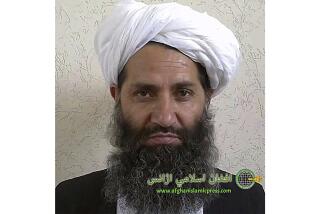Taliban leader calls for peace talks, new attacks on foreign troops
- Share via
KABUL, Afghanistan -- The reclusive leader of Afghanistan’s Taliban said Tuesday that his militant group was willing to begin peace negotiations, even as he urged stepped-up attacks on foreign troops to force them out of the country.
In a lengthy and wide-ranging email message, Mullah Mohammad Omar called on Afghans to boycott elections scheduled for early 2014 and urged Afghan police, soldiers and paramilitary personnel to turn their guns on foreign troops -- as well as Afghan government troops cooperating with U.S.-led coalition forces.
In a separate development, individual members of the Afghan High Peace Council -- a group appointed by President Hamid Karzai to negotiate with Taliban elements -- said Tuesday they’ve held secret talks with the Taliban to try to bring momentum to a peace process that’s foundered since its inception.
Taliban spokesman Zabiullah Mujahid said the statements were a deliberate lie designed to upstage his group’s important Eid message. “The High Peace Council wants to keep its office open and money flowing, which is why they are spouting such propaganda,” Mujahid said. “We don’t intend to talk with the puppet Kabul government. We don’t have contact with them, not individual talks, not group talks.”
The one-eyed Omar, who has a $10-million bounty on his head, has made a practice in recent years of distributing a message shortly before Eid al-Fitr, a three-day Islamic holiday celebrating the end of the holy month of Ramadan when devout Muslims pray and fast.
Omar said in the five-page letter that the Taliban recently set up an office in Doha, the capital of Qatar, to hasten the departure of foreign forces from Afghanistan and to form an inclusive government based on “Islamic principles.”
“We do not think of monopolizing power,” he wrote. “Those who truly love Islam and the country and have commitment to both ... this homeland is theirs.”
Omar also welcomed humanitarian organizations to Afghanistan as long as they don’t push “non-Islamic ways” on Afghans. In May, a suicide attack on the Red Cross compound in Jalalabad was widely condemned and prompted the aid group to pull back on its operations in Afghanistan. The Taliban denied responsibility for the attack, in which an Afghan guard was killed.
Omar’s message was particularly critical of the planned 2014 elections, which he called a “deceiving drama” all but decided in Washington. “Participation in such elections is only a waste of time, nothing more,” he said.
His stance is consistent with the Taliban’s attitude toward past Afghan elections, during which the group directed gunmen to target candidates and block roads leading to polling stations.
Omar’s message, tone and arguments suggest the group is out of touch, some analysts said. “As always, they’re trying to fuel panic and fear in people with this message,” said Abdul Wahid Taqat, a Kabul-based military analyst. “They know they’re not popular and couldn’t win an election, so they boycott.”
The group’s relatively welcoming message to international humanitarian groups is an attempt to win popularity among ordinary people that won’t work, Taqat added.
“If the Taliban respected humanitarian organizations, it wouldn’t kill innocent women and children every day,” he said. “These people don’t respect humanity, children, religion and Islam, how they can welcome humanitarian organizations? Whatever Mullah Omar has said in his Eid message is baseless.”
Members of Karzai’s inner circle said they’d held discreet discussions with the militant group on the possible framework for more formal peace talks. “There have been individual talks with the Taliban,” said Habibullah Fauzi, a High Peace Council member. “Talks have taken place many times.”
The opening of a Taliban political office in June in Qatar was mired in controversy, with Karzai highly critical of the office’s sign, flag and name, which he said was falsely meant to suggest that the group was a legitimate national representative.
Omar, who is suspected of living in Pakistan, has made no public appearances or speeches since he fled Afghanistan in late 2001 after U.S. forces invaded and toppled the Taliban. Afghanistan’s de facto head of state from 1996 to 2001, he is considered the Taliban’s spiritual leader.
Despite his elevated status within the militant group, relatively little is known about him other than descriptions that he’s tall, shy and reluctant to speak with foreigners.
ALSO:
Syria firing missiles into civilian areas, rights group says
Turkey’s former military chief sentenced to life in prison
Lab-grown burger from stem cells introduced: Looks good, tastes blah
mark.magnier@latimes.com
Baktash reported from Kabul, and Magnier from New Delhi.
More to Read
Sign up for Essential California
The most important California stories and recommendations in your inbox every morning.
You may occasionally receive promotional content from the Los Angeles Times.













